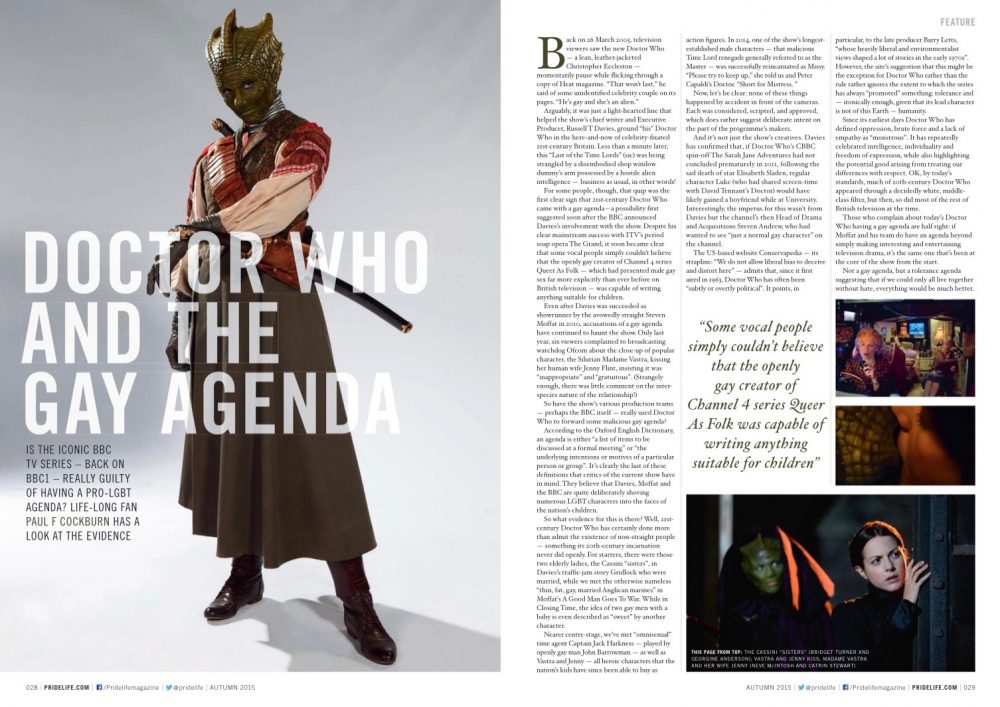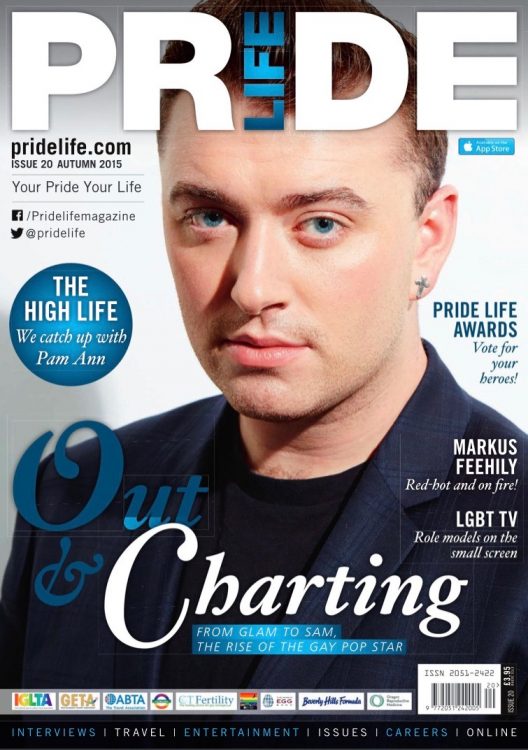Is the iconic BBC TV Series – back on BBC1 – really guilty of having a pro-LGBT agenda? Life-long fan Paul F Cockburn has a look at the evidence.

Back on 26 March 2005, television viewers saw the new Doctor Who – a lean, leather-jacketed Christopher Eccleston – momentarily pause while flicking through a copy of Heat magazine. “That won’t last,” he said of some unidentified celebrity couple on its pages. “He’s gay and she’s an alien.”
Arguably, it was just a light-hearted line that helped the show’s chief writer and Executive Producer, Russell T Davies, ground “his” Doctor Who in the here-and-now of celebrity-fixated, 21st century Britain. Less than a minute later, this “Last of the Time Lords” (sic) was being strangled by a disembodied shop window dummy’s arm possessed by a hostile alien intelligence – business as usual, in other words!
For some people, though, that quip was the first clear sign that 21st century Doctor Who came with a Gay Agenda – a possibility first suggested soon after the BBC announced Davies’s involvement with the show. Despite clear mainstream success with ITV’s period soap opera The Grand, it soon became clear that some vocal people simply couldn’t believe than the openly gay creator of Channel 4 series Queer As Folk – which had presented male gay sex far more explicitly than ever before on British television – was capable of writing anything suitable for children.
Even after Davies was succeeded as “showrunner” by the avowedly straight Steven Moffat in 2010, accusations of a Gay Agenda have continued to haunt the show. Only last year, six viewers complained to broadcasting watchdog Ofcom about the close-up of popular character Madam Vastra kissing her wife Jenny Flint, insisting it was “inappropriate” and “gratuitous”. (Strangely enough, there was little comment on the inter-species nature of the relationship!)
So have the show’s various production teams – perhaps the BBC itself – really used Doctor Who to forward some malicious Gay Agenda?
According to the Oxford English Dictionary, an agenda is either “a list of items to be discussed at a formal meeting” or “the underlying intentions or motives of a particular person or group”. It’s clearly the last of these definitions that critics of the current show have in mind. They believe that Davies, Moffat and the BBC are quite deliberately shoving numerous LGBT characters into the faces of the nation’s children.
So what evidence for this is there? Well, 21st century Doctor Who has certainly done more than admit the existence of non-straight people – something its 20th century incarnation never did openly. For starters, there were those two elderly ladies in Davis’s traffic-jam story “Gridlock”, who were married, while we met the otherwise nameless “thin, fat, gay, married Anglican marines” in Moffat’s “A Good Man Goes To War”. While in “Closing Time”, the idea of two gay men with a baby is even described as “sweet” by another character.
Nearer stage-centre, we’ve met “omnisexual” time agent Captain Jack Harkness – played by openly gay man John Barrowman – as well as Vastra and Jenny – all heroic characters that the nation’s kids have since been able to buy as action figures. In 2014, one of the show’s longest-established male characters – that malicious Time Lord renegade “generally referred to as The Master” – was successfully reincarnated as Missy: “Please try to keep up. Short for Mistress”.
Now, let’s be clear: none of these things happened by accident in front of the cameras. Each was considered, scripted, and approved, which does rather suggest deliberate intent on the part of the programme’s makers.
And it’s not just the show’s creatives. Davies has confirmed that, if Doctor Who’s CBBC spin-off The Sarah Jane Adventures had not concluded prematurely in 2011, following the sad death of star Elisabeth Sladen, regular character Luke (who had shared screen-time with David Tennant’s Doctor) would have likely gained a boyfriend while at University. Interestingly, the impetus for this wasn’t from Davis but the channel’s then Head of Drama and Acquisitions Steven Andrew, who had wanted to see “just a normal gay character” on the channel.
The US-based website Conservapedia – its strapline: “We do not allow liberal bias to deceive and distort here.” – admits that, since 1963, Doctor Who has often been “subtly or overtly political”. It points, in particular, to the late producer Barry Letts, “whose heavily liberal and environmentalist views shaped a lot of stories in the early 1970s”. However, the site’s suggestion that this might be the exception for Doctor Who rather than the rule rather ignores the extent to which the series has always “promoted” something: tolerance and – ironically enough, given that its lead character is not of this Earth – humanity.
Doctor Who has defined oppression, brute force and a lack of empathy as “monstrous” since its earliest days. It has repeatedly celebrated intelligence, individuality and freedom of expression, while also highlighting the potential good arising from treating our differences with respect. OK, by today’s standards, much of 20th century Doctor Who appeared through a decidedly white, middle-class filter – but then, so did most of the rest of British television at the time.
Those who complain about today’s Doctor Who having a Gay Agenda are half right: if Moffat and his team do have an agenda beyond simply making interesting and entertaining television drama, it’s the same one that’s been at the core of the show from the start. Not a Gay Agenda, but a Tolerance Agenda suggesting that if we could only all live together without hate, everything would be much better.

First published in Pride Life #20 Autumn 2015.